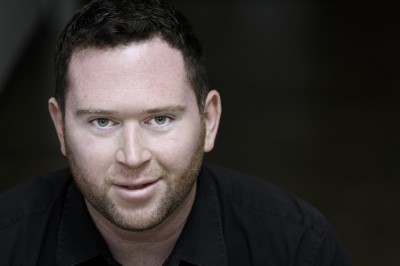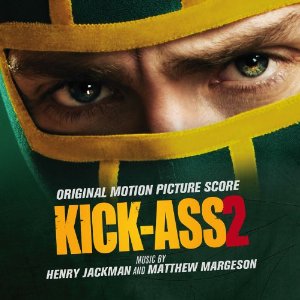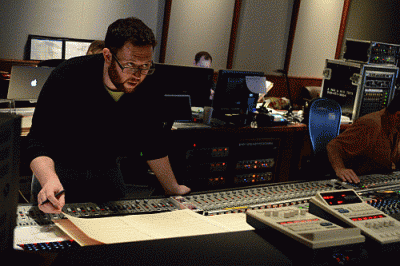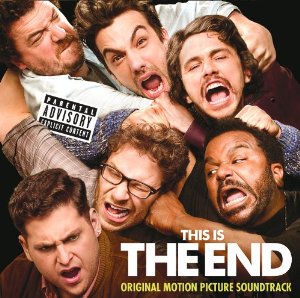Composer Matthew Margeson may not be as well known as his contemporaries like Hans Zimmer and Danny Elfman but in the last few years he’s built quite a musical catalog of awesome soundtracks. His body of work includes doing work on Wreck-It Ralph, This is the End, X-Men: First Class and numerous others. His current, fully credited, soundtrack for Kick-Ass 2 is epic and beautiful.
 Doing the soundtrack for a movie sequel must be a bit daunting – you have to keep the tone and some of the elements from the original film, while creating something new. Can you talk a little bit about how you go about doing this?
Doing the soundtrack for a movie sequel must be a bit daunting – you have to keep the tone and some of the elements from the original film, while creating something new. Can you talk a little bit about how you go about doing this?
MM: For Kick-Ass, we had a theme from the first film that from the start, we made a decision to keep. It wasn’t a reboot, so we didn’t want to completely reinvent the wheel. I think going back to the Kick-Ass theme automatically launched us into somewhat familiar territory. Moving forward from there, it was really focusing on the new elements and characters that gave us license to expand our world with some new tunes, sounds and musical ideas.
Another thing to look at is the sonic quality and orchestration. There was the use of a traditional orchestra in the first film with an added layer of more contemporary sounding instruments, like electric guitars, drums, etc. Again, we knew we wanted to have orchestra be the foundation of our sequel, but I think we really pushed the use of the more edgy elements in this one; they play more of a major role, especially in the composition of our new villain and his gang for who we incorporated influences of heavy metal and hip-hop to resonate with the groups developing identity.
Can you talk a little bit about what you wanted to accomplish with the Kick-Ass 2 score?
MM: I guess as mentioned above, a big challenge from the beginning was to be able to come up with some new concepts while still being faithful to the palette and world that was established for the first film. There had to be a balance of new and old. We have both new and old characters and story themes, so it was definitely in our best interest to find that same balance to help tell the story musically.
How did you get started in this business?
MM: I moved out to Los Angeles from the East coast in 2003. I was lucky enough to land an assistant position with composer Klaus Badelt. I worked with Klaus for about 2 years and started assisting another composer, Jim Dooley. I learned so much from Klaus and Jim: musically, politically, how to run a meeting, how to talk to directors, and the list of lessons goes on.
Eventually, I started doing some arranging for Dooley, and that led to working with Hans Zimmer on some of his projects. I think learning from successful people is really invaluable. There are actually so many non-musical related things that no one really considers when breaking into this business.
The Kick-Ass 2 score, especially the opening score has a sweeping feel to it. What elements do you think make a great super-hero score?
MM: I guess some sort of majesty, whatever you want to call it, a big tune, massive brass fanfares, huge orchestral moments, are all part of the superhero genre to some degree. There are so many ways to execute these devices however, like recently proven with movies like The Avengers, The Dark Knight, and so on.
All of these movies have such a simple and bold idea, something that is easily recognizable, but they’re all carried out differently, which makes them all really unique in their own way. If the tune is good, and works for the superhero in question, it really causes for people to subconsciously relate it to a specific movie or superhero, which is always cool.
What would you say are influences in your musical scores?
MM: I guess one could argue that all of the music that ANYONE ever listens to for recreation has to, in some way, etch a permanent place in the brain and influence what comes out creatively. I listened to a ton of the classics when I was younger… Zeppelin, The Beatles, Hendrix, and in my teens really went through a huge jazz and classical phase.
I’m a big fan of Bach and Stravinsky, for different reasons. Film music is something I became really fascinated with again because of the obvious scores: Star Wars, Elfman’s Batman, anything by Kamen, etc. I wouldn’t necessarily say these scores are what ‘influence’ my music today, but they are for sure what sparked my interest.
A score has to work closely with the soundtrack, how involved are you in the music selection process?
MM: Actually, the composer, for the most part, isn’t always part of the actual selection of needle drop songs that will be a part of the song soundtrack. Sometimes they are part of the discussion, but there are producers and music supervisors who really specialize in this. We’ll always be asked, “What do you think of how that song works?” but it’s not often that we’re bringing those initial song selections to the table.
Sometimes during the process of composing, however, the composer is put in a situation where we’re writing score that has to seamlessly go into a pop-song, or out of one. In these cases, we have to take into consideration the key of the song, the tempo of the song, and how we want to build into or out of it. In other cases, a few in Kick-Ass2 actually, we are asked to take a specific needle-drop song and add orchestral or more score-ish elements to it to make it a bit more cinematic.
Do you have to be a successful musician – actually play multiple instruments to be a successful composer, how many instruments should one know how to play and then which ones do you play?
MM: I think that is a grey area. I know composers that can pretty much pick up any instrument and you’d think they had trained in that instrument for decades. I also know amazing composers who can barely play a scale on the piano with the correct fingering, or just about get out a simple guitar chord. There really isn’t a minimum by any means.
Everyone is different and there are both positive and negatives aspects of being prolific in specific instruments. As for myself, I’m a piano player. I’ve spent many years playing. However, if I were forced to, I can get by on a few of the other common instruments: guitar, bass, trumpet, basic percussion instruments.
Which composers inspire you and why?
MM: There have been so many movies and scores created that I guess the ones that really stand out for me are the composers who take leaps and come up with something really new. I am always inspired by guys like Clint Mansell, Cliff Martinez, & Morricone, among a lot of others.
You can always expect to hear something a bit new and weird, which is awesome; it’s how we progress. I’m also always blown away by people like John Powell and of course John Williams. Their orchestral ideas, textures, and phrasing are definitely inspired.



